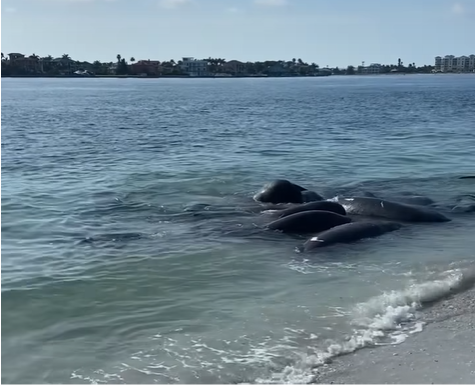Stop calling us about manatees, they're just mating, Florida authorities tell beachgoers

“If you see this, no you didn’t.”
This is the message a Florida sheriff’s office shared with the public after receiving calls about groups of manatees writhing on the beach.
While the animals often look like they’re distressed, they’re actually just mating, the Pinellas County Sheriff's Office assured in a social media post.
“We get calls all the time from citizens when they see this, believing the manatees are in distress. We can assure you they are more than fine,” reads the post which is accompanied by a video clip of the creatures gathered close to the shore.
Manatee dies of a sex injury:Beloved Florida manatee's death at aquarium came after traumatic sex injury, records show
Manatees’ mating rituals are usually a crowd event, according to conservation organization Save the Manatees, as the “sea cows” form mating herds close to the shore. Several males, known as bulls, seek after a female, known as a cow, until she is ready to mate. They are not so picky when mating begins, however, and appear to engage “indiscriminately” until finished, when the males then leave and take no part in calf rearing.
Once cows become pregnant, gestation lasts about a year and the calf will then nurse from its mother for one to two years, Save the Manatees says.
How rare are manatee births?
Manatee reproduction rates are low. A manatee averages just one calf birth every two to five years, per the nonprofit, which contributes to their status as a protected species.
Coral reef preservation:Scientists rally to rescue coral from unprecedented bleaching event in the Florida Keys
Disturbing manatees is illegal in Florida
The Pinellas County Sheriff's Office also reminded that touching or disturbing manatees is not only potentially dangerous but against the law.
According to the Florida Fish and Wildlife Conservation Commission, feeding, harassing, harming, hunting, shooting, killing, pursing, molesting or annoying manatees are all breeches of the Marine Mammal Protection Act of 1972, the Endangered Species Act of 1973, and the Florida Manatee Sanctuary Act of 1978. Those who violate the legal protections may be subjected to a $100,000 and/or one year in prison.
While manatees breed throughout the year, spring and summer are peak season, meaning an increase in sightings and phone calls, said the sheriff’s office.
“So, if you see this, there’s no need to call, they are a-okay!” said the office. Instead, they suggest you watch from a safe distance, if you want to watch at all. Instead of making a report, appreciate the manatees from a distance.
Disclaimer: The copyright of this article belongs to the original author. Reposting this article is solely for the purpose of information dissemination and does not constitute any investment advice. If there is any infringement, please contact us immediately. We will make corrections or deletions as necessary. Thank you.


